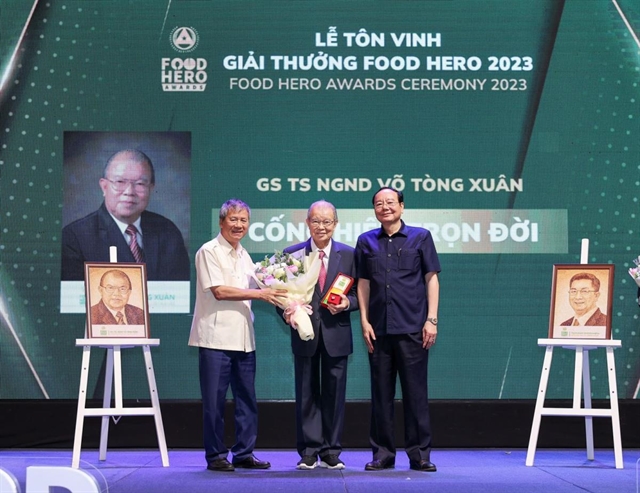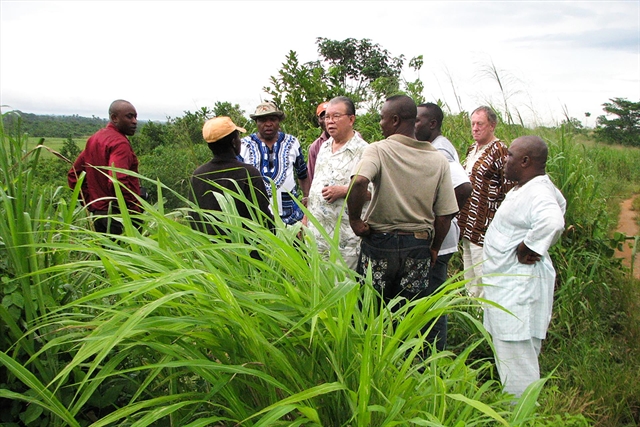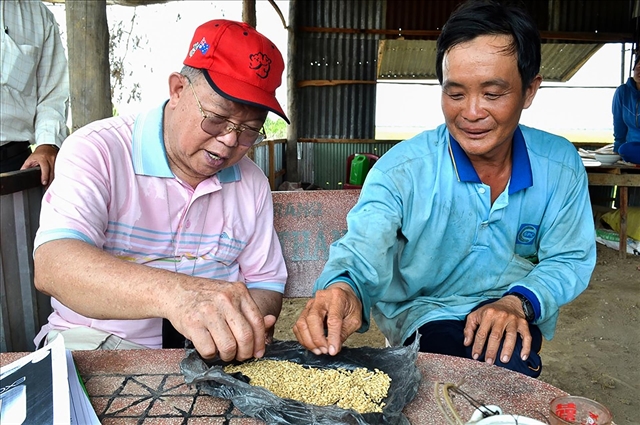 |
| Professor Võ Tòng Xuân (centre) receives the “Lifetime Achievement” Award at the 2023 Food Hero Awards given by the Association for Food Transparency and the Food Share Sustainable Food Development Network in HCM City. – VNA/VNS Photo |
HCM CITY – Late Professor Võ Tòng Xuân made an outsized contribution to Việt Nam’s agriculture and food security with his research and creation of many new rice varieties to improve yields in the Cửu Long (Mekong) Delta.
The feted scientist, who was born in 1940 into a poor family with six siblings in the delta province of An Giang as the eldest child, passed away on Monday (August 19).
To start at the beginning, he received a scholarship to study at the Philippine Agricultural University in Los Banos in 1961 and graduated in 1966 with a bachelor’s degree in agricultural chemistry. He was then accepted as a PhD student at the International Rice Research Institute (IRRI) in the Philippine capital, Manila.
In 1971 he returned to Việt Nam and worked at Cần Thơ University.
Then he defended his doctoral thesis on rice farming techniques in tropical regions in Japan in 1975.
In 1976, the delta faced an outbreak of a new variety of brown planthoppers, and farmers suffered severe losses because existing varieties could not resist the pest.
He asked the IRRI to send him some rice varieties that could resist the pest, and received IR36 rice seeds.
He researched methods to produce a lot of the IR36 seeds quickly, and persuaded the Cần Thơ University management to get all 2,000 students to temporarily stop studying and participate in helping farmers produce the seed.
In three months they produced two tonnes of the seeds from the five grammes he had received, and expanded farming of the variety to the entire delta.
This helped farmers cope with the brown planthopper and get high yields of eight to nine tonnes per hectare.
His seminal work also helped ensure food security in Việt Nam and the world.
IR36 is now one of the most popular rice varieties grown in Asia.
He also researched expanding the cultivation of high-yield rice varieties from IRRI, such as Thần Nông, IR33, and IR64, in the delta.
Culturing these rice varieties ultimately helped Việt Nam from being a rice importer to one of the world’s three top exporters and secure food.
He once said his idea of finding high-quality rice varieties began when he was in high school with the hope of improving the lives of Vietnamese farmers.
“Every time a rice crop was growing, I would see my aunt and her husband work very hard; the life of Vietnamese farmers, in general, was very miserable.
“From then on, I wanted to study well and help improve the lives of farmers.”
He made significant contributions to establishing and developing the Mekong Delta Rice Research Institute, a renowned gene bank for high-quality rice.
Trần Đình Long, chairman of the Việt Nam Seed Association, said when he was the director of the Việt Nam – Russia Seed Centre in 1985-87, Xuân approved his imports of seeds from other countries.
Thanks to the combination of genetic resources and application of modern technology, Việt Nam has become self-sufficient in 95 per cent of its crops, especially pure rice varieties, he added.
International co-operation
 |
| Professor Võ Tòng Xuân (centre) works with farmers in Aleppo, Syria, in 2004. – VNA/VNS Photo |
Xuân participated in many international cooperation programmes and regularly assisted developing countries with developing their agriculture.
He and his team took the delta’s rice varieties to many African countries, including Nigeria, Sudan, Mozambique, Rwanda, Burundi, and Liberia. They designed irrigation systems to help local farmers grow them.
With this help, they managed to increase the rice crop from one per year to two, and yields from two to three tonnes per hectare per crop to 4.7 tonnes.
Nguyễn Thị Lang, head of the Mekong Delta High Agricultural Technology Research Institute, said that once Xuân phoned her from West Africa and instructed her to create some new rice varieties and send them to help farmers there.
She sent 10 varieties, and they all grow well now, she said.
As a testament to his international reputation and respect, she said, “When I go to international conferences, many foreign scientists would ask me if I knew Professor Xuân.”
He was, in fact, dubbed “Dr Rice” by foreign colleagues.
As a member of the International Fertiliser Development Centre, IRRI and International Potato Centre, he helped foster cooperation between educational organisations, enterprises, government offices and international agencies to develop Việt Nam’s agriculture.
Nguyễn Tiến Dũng, chairman of the Council of Nam Cần Thơ University, said: “Teacher Võ Tòng Xuân made important contributions to the cause of education and training in the south.”
During more than 50 years of teaching, he was rector of An Giang University, Tân Tạo University, and Nam Cần Thơ University at various times and trained generations of agricultural scientists.
Hồ Quang Cua, one of his students and a former deputy director of the Sóc Trăng Province Department of Agriculture and Rural Development, created many outstanding rice varieties, including ST24 and ST25, that won awards for the world’s best rice.
Xuân was renowned as an agricultural extension scientist for his simple approach to explaining farming techniques to farmers. Not surprisingly, he is revered by millions of farmers in the South.
He wrote several much-referenced books and textbooks on agriculture.
In addition to creating new crop strains, he also found ways to treat alum-affected soil in the delta to improve productivity.
In Long An Province’s northern region and Đồng Tháp Province’s Hồng Ngự District, where soil is severely contaminated with alum, he recommended building irrigation works to wash it away from fields and using lime powder to neutralise acidity to improve conditions for crops.
He was elected to the National Assembly for three tenures and was important in developing national agricultural policies.
He won numerous titles and wards, including Professor of Agronomy in 1980, Labour Hero in 1985, People’s Teacher in 1999 and Labour Order, First Class, in 1986.
Internationally, he won the Order of the Rising Sun, Gold Rays with Neck Ribbon, from Japan in 2022.
In 2023, he became the first Vietnamese scientist to win the Vinfuture Prize for his work on “Invention and Dissemination of Disease-Resistant Rice Varieties.” – VNS
 |
| Professor Võ Tòng Xuân (left) checks the quality of rice planted by farmers. – VNA/VNS Photo |
- Reduce Hair Loss with PURA D’OR Gold Label Shampoo
- Castor Oil Has Made a “Huge” Difference With Hair and Brow Growth
- Excessive hair loss in men: Signs of illness that cannot be subjective
- Dịch Vụ SEO Website ở Los Angeles, CA: đưa trang web doanh nghiệp bạn lên top Google
- Nails Salon Sierra Madre
 VnExpress News The News Gateway of Vietnam
VnExpress News The News Gateway of Vietnam





